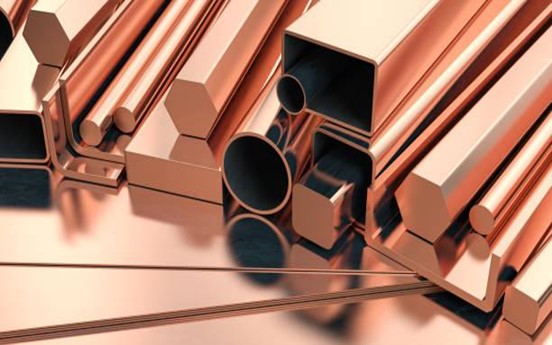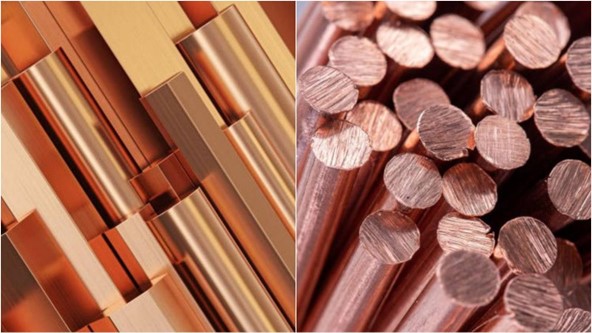At first glance, bronze and copper appear quite similar. Both materials come in various finishes that resist corrosion to some extent, which is why you can almost find them everywhere you look. Even so, the choice between bronze and copper remains crucial when embarking on a metal fabrication project. These two metals offer distinct properties and advantages that can significantly impact the success and quality of your work. This article highlights bronze and copper’s properties, benefits, and applications. Let’s dive into the details and determine which metal suits your project requirements.
Properties Contrast: Copper vs Bronze
When considering materials for metal fabrication, such as bronze and copper, you must understand their unique properties before settling on either metal grade. This will help you decide which material to use based on your project specifications, balancing various essential factors.
Contrast Table: Properties of Bronze vs Copper
The table below provides a clear comparison highlighting copper and bronze’s vital properties.
| Property | Copper | Bronze |
| Composition and Structure | Copper is a pure element. This means copper has a uniform structure, making it easy to work with. | Bronze is an alloy of copper and tin, often with other elements added, resulting in a metal that is tougher and more durable than pure copper. |
| Strength and Durability | Copper provides good strength and flexibility, making it easy to bend and shape without breaking. However, it is softer than bronze, making it more prone to scratches and dents. | Bronze is significantly stronger and more durable than copper, making it ideal for high-strength and wear resistance applications. The added tin enhances its hardness and impact resistance. |
| Corrosion Resistance | Copper naturally forms a protective oxide layer that prevents further corrosion. However, it can tarnish and develop a green patina over time. | Bronze inherits copper’s corrosion resistance but surpasses it, particularly in marine environments. The tin in bronze enhances its ability to withstand corrosion. |
| Electrical Conductivity | Copper offers high electrical conductivity. Its high conductivity makes it ideal for electronics, motors, and generators. | While bronze conducts electricity, its conductivity is lower than that of copper. |
| Thermal Conductivity | Copper’s high thermal conductivity allows it to transfer heat efficiently. It quickly and evenly distributes heat, which is why it is favored in culinary applications. | Bronze has good thermal conductivity but does not match the level of copper. It is often used in applications requiring heat resistance and thermal stability. |
| Workability | Copper’s malleability and ductility make it easy to shape, form, and join. It can be easily bent and soldered for detailed designs. | Although bronze is more challenging to work with due to its increased hardness, metal fabricators can still cast, mold, and machine it with the right tools. |
| Cost and Availability | Copper is widely available and generally more affordable than bronze. Its abundance and lower cost make it practical for many industries. | Bronze can be more expensive depending on the proportion of tin and other alloying elements used. However, the investment in bronze pays off with longer-lasting and more reliable components. |
Bronze vs Copper Metal Fabrication: Which One is Better?

different rolled metal products
Choosing between bronze and copper for sheet metal fabrication largely depends on the specific application and the desired properties of the final part. Therefore, understanding where bronze and copper excel can help you determine the best material for your metal fabrication projects.
Here are various aspects to consider to help you choose the suitable metal for your project:
Strength and Durability
Copper is known for its excellent malleability and ductility, making it easy to shape, bend, and form. This makes copper an excellent choice for projects requiring intricate designs or complex shapes. However, copper is softer than bronze; consequently, it can be more prone to dents, scratches, and general wear and tear.
On the other hand, bronze is much more complex and more durable than copper. The addition of tin and other alloying elements makes bronze highly resistant to wear and impact. This strength makes bronze ideal for heavy-duty applications and environments where manufacturers prioritize durability.
Corrosion Resistance
Both metals offer good resistance to corrosion, but bronze generally performs better, especially in marine environments. Copper develops a protective oxide layer that prevents further corrosion. Over time, copper can tarnish and develop a green patina, which, while protective, may not be desirable for all projects.
Bronze, due to its alloying elements, offers superior corrosion resistance. This makes it an excellent choice for components exposed to harsh conditions. Moreover, bronze’s resistance to saltwater corrosion ensures long-lasting performance.
Electrical and Thermal Conductivity
When it comes to electrical conductivity, copper remains unmatched. Its high conductivity makes it the preferred material for electrical wiring, components, and electronics. More so, copper’s excellent thermal conductivity also makes it ideal for applications where efficient heat transfer is crucial.
While still conducting electricity and heat, Bronze does so to a lesser extent than copper. This makes it less suitable for applications where metal fabricators need maximum conductivity. However, bronze’s ability to withstand higher temperatures and its thermal stability makes it a good choice for components subjected to high heat.
Workability and Cost
Copper is highly malleable and easy to work with, which is advantageous for projects requiring detailed work. Its ease of soldering and shaping makes it a versatile choice for many fabrication tasks. Meanwhile, bronze, while more challenging to work with due to its increased hardness, can still be cast, molded, and machined with the right CNC machining bronze tools.
Additionally, copper is widely available and generally more affordable than bronze, making it a cost-effective option for many projects.
Applications of Bronze vs Copper Metal Fabrication

close-up of shiny bronze inserts for threading
The applications of bronze and copper are vast because both metals possess unique properties that make them ideal for specific uses in various industries.
Here’s a detailed look at how metal fabricators utilize each metal:
Applications of Copper in Metal Fabrication
Check the applications of copper in metal fabrication below:
Electrical Wiring and Components
Copper’s excellent electrical conductivity makes it the go-to material for electrical wiring, connectors, and circuit boards. Its low electrical resistance and high thermal conductivity ensure efficient energy transmission, making it ideal for power generation, transmission, and distribution systems. So, it’s not surprising that copper wire is used in almost every electrical device, ensuring they work efficiently and safely.
Plumbing
Copper pipes and fittings dominate plumbing systems due to their resistance to corrosion and ease of installation. Copper doesn’t rust and can handle high temperatures, making it perfect for water supply systems in homes and buildings. Its ability to inhibit bacterial growth ensures safe drinking water.
Heat Exchangers and Radiators
Copper’s superior thermal conductivity makes it a staple in heat exchangers, radiators, and air conditioning systems. It efficiently transfers heat, making it ideal for cooling and heating applications in various industries.
Cookware and Kitchen Utensils
Copper cookware is prized for its excellent heat distribution, allowing precise temperature control. Professional chefs and home cooks use copper pots, pans, and utensils to prepare meals evenly and avoid hot spots. Besides, copper’s antimicrobial properties make it a hygienic choice for kitchen tools.
Roofing and Architectural Elements
Copper’s malleability and aesthetic appeal make it a popular choice for roofing, gutters, and architectural details. Over time, copper develops a natural patina that protects it from the elements and adds to its visual appeal.
Applications of Bronze in Metal Fabrication
Here are the applications of bronze in metalworking:
Marine Hardware
Bronze’s exceptional corrosion resistance and durability make it suitable for marine applications. Shipbuilders use bronze to fabricate ship fittings, propellers, and underwater bearings, which must withstand constant exposure to seawater.
Aerospace and Defense
Bronze components serve in aerospace and defense applications due to their strength, reliability, and resistance to extreme conditions. Aircraft manufacturers use bronze alloys for parts exposed to high stress and temperatures. Military vehicles and weaponry incorporate bronze for its durability and performance.
Industrial Machinery
Bronze components are essential for strength and durability in heavy-duty industrial machinery. These components reduce wear and tear on machinery, extending the lifespan of equipment.
Bronze gears, valves, and pumps are standard in manufacturing industries. Further, manufacturers prefer bronze for bearings, bushings, and other components requiring high wear resistance and low friction. These parts endure high-stress environments and minimize mechanical failure risks.
Sculptures and Art
Bronze remains a favorite material for sculptures and art pieces due to its workability and ability to capture fine details. Artists use bronze to create enduring sculptures that withstand the test of time. The alloy’s strength allows for intricate and large-scale works.
Conclusion
Choosing bronze and copper for metal fabrication projects depends on their unique properties and applications. Copper offers excellent electrical conductivity, making it perfect for electrical wiring, plumbing, and heat exchangers. Its antimicrobial qualities also make it ideal for cookware and architectural pieces. Conversely, bronze, an alloy of copper and tin, stands out for its strength, durability, and corrosion resistance, making it suitable for marine hardware, industrial machinery, and artistic sculptures. By considering these properties and applications, you can make an informed decision that best suits your project needs.
At Zintilon, we offer expert advice and top-quality materials to ensure your project succeeds. Whether you need the strength of bronze or the conductivity of copper, our team is here to help you make the right choice. Reach out today, and let us provide you with the perfect solution for your metal fabrication needs.
